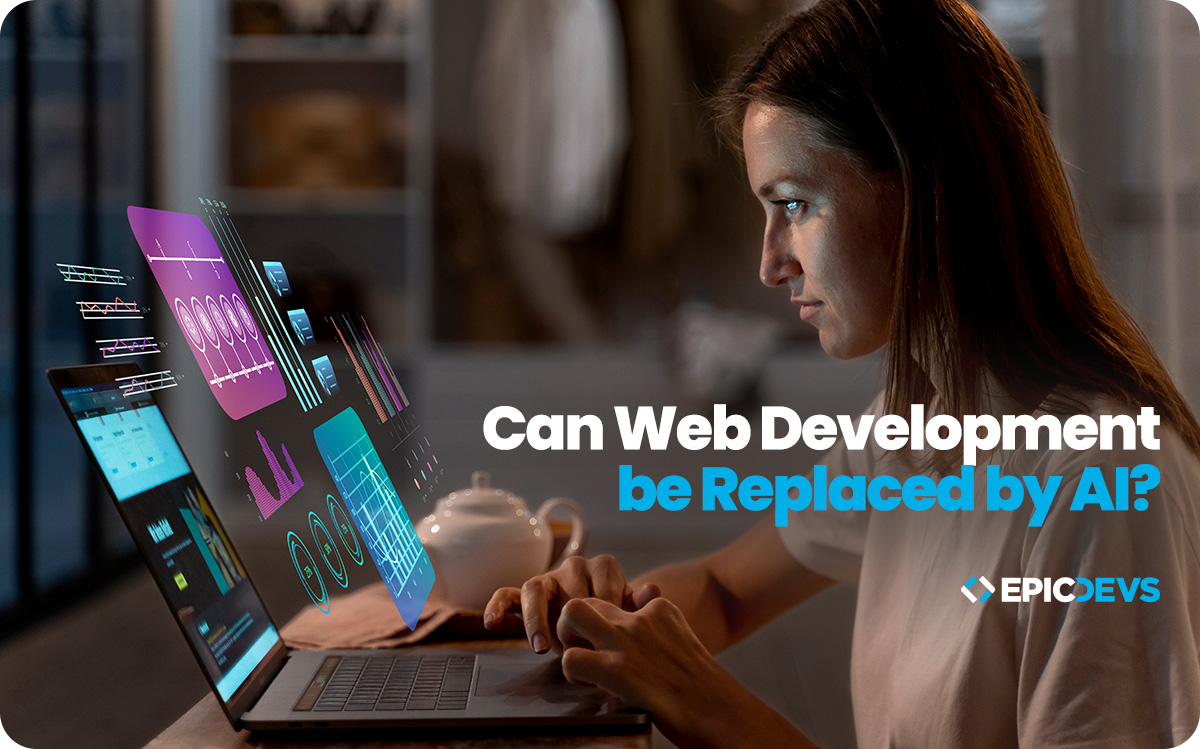From using it to get recipes to building workout routines, it feels like AI (Artificial Intelligence) is everywhere nowadays. And, beyond its everyday applications, these advancements in machine learning, blockchain, and other digital technologies have created a hot debate: Can web development be replaced by AI? It’s not crazy to think so.
Consider AI-powered WordPress plugins, for example, which can help you build and manage a successful website. It’s great if you think about it! As AI technology advances, you need to keep up as well.
With predictions of the AI sector expanding to a $126 billion market by 2025, you’re not the only one thinking about this. Businesses are also recognizing the need to welcome artificial intelligence in web development. However, there’s a clear distinction between leveraging this new technology and relying on it entirely.
Web development has improved a lot over the last few decades. From bland static websites to the dynamic and visually stunning pages we have today, its growth has been nothing short of impressive. The focus, however, has always been on providing the best user experience. That’s where automation comes in.
As Ilán Vivanco, our CTO, highlights, ‘AI can provide a few solutions — if you’re able to clearly express your goals — but as experienced coders know, the first answer is rarely the best. There are many nuances to consider, such as the latest standards, existing APIs, performance optimization, or security measures.’
AI has many many uses, but its main one has been, for a while, the automation of repetitive tasks. This can, for instance, enhance productivity in web development. Tools like AI-powered code generators, design assistants, and CMS’s are making multiple aspects of the development process way easier. Platforms like Wix and WordPress, for example, use AI to offer its users automated website designs based on user preferences, quickly generating them by analyzing vast datasets humans would take weeks doing.
AI can also optimize coding by suggesting improvements and refactoring code. Large language models (LLMs) like GPT-4, for instance, can help developers write cleaner, more efficient code and automate tasks like bug fixing and performance optimization.
AI and ML automation have improved operational efficiency by an average of 40% across sectors and 82% of organizations now require machine learning skills.
Are there limitations?
As with anything, you need to use AI smartly and leverage its features without relying on them completely. Although it may seem as though every recommendation is perfect and you don’t need to tweak it, it’s important to remember that you do have control over how AI works!
You can give them instructions, keywords, specific goals and/or even your entire content and just ask it to “perfect it.” You are in control.
Ilán Vivanco, our CTO, emphasizes, ‘I often use AI tools as a starting point, a form of initial brainstorming from which I can iterate and optimize my approach to achieve the desired outcome. AI-generated code serves as a foundation, but the refinement process requires a human touch.’
This is even more true when remembering that AI has several limitations that prevent it from fully replacing human web developers, such as:
1. Creativity and Problem-Solving
Coders, don’t take it personally: web development is not just about writing code; it involves creativity, strategic thinking, and problem-solving skills. These are all skills that current AI cannot match. Human developers bring to the table unique insights and solutions to complex problems, something AI struggles with because of its lack of contextual understanding and abstract reasoning. Think about it like this: AI can write code, sure, but it can’t really understand the bigger picture of why the website needs to be built a certain way. It just does what its told, without having to think “outside the box”.
AI can help in generating ideas or starting points, but the nuanced and creative elements of design and problem-solving remain, for now, distinctly human domains.
2. Handling Complex Tasks
As with abstract reasoning, AI can assist with simple, repetitive tasks, but it falls short when it comes to handling the more complex and dynamic aspects of web development.
For example: if you’re creating a website, you need a scalable and resilient server architecture (which ensures data integrity during migrations), or a need to integrate multiple systems seamlessly. These are all tasks that require human foresight and strategic planning. AI can analyze large datasets and suggest optimizations, but it doesn’t have the ability to make strategic decisions like humans do based on a deep understanding of business needs and user behavior.
Imagine building a house: you wouldn’t trust a robot to design the foundation (scalable server architecture) or ensure the plumbing works together smoothly (system integration)!

3. Quality and Security
Although AI tools can help with, for instance, creating custom HTML and CSS code snippets, this technology often lacks the robustness and security needed for real-world applications. It can miss subtle flaws and/or extreme ones, leading to unstable applications and potential security vulnerabilities. This cannot happen.
Human oversight, therefore, is crucial to ensure that the code meets high standards and is secure from potential threats.
4. User Experience (UX)
And last but not least, creating an intuitive and engaging user experience requires an understanding of user psychology and behavior that AI cannot fully replicate. Human developers use their knowledge and experiences to design interfaces that resonate with users on an emotional level. The latter is crucial, as AI cannot feel.
AI can provide data-driven insights and suggestions, but the empathetic understanding of user needs is 100% human.
A Complementary Tool, Final Thoughts
Rather than viewing AI as a replacement, it’s more accurate to see it as a powerful tool that enhances human capabilities, not replace them.
AI automates repetitive tasks and/or helps with other tedious jobs, helping developers focus on higher-level priorities like creativity and strategic planning. For example, AI can handle tasks like server maintenance, log analysis, and performance monitoring, while human developers work on the more complex and creative aspects of a project.
In the words of Ilán Vivanco, ‘Ignoring AI tools altogether would be a misstep, just like choosing candles over electric lights in the modern age. Developers remain in charge, guiding AI with specific instructions to tailor outputs to their needs, enhancing productivity and enabling focus on more complex tasks.’
As AI evolves, its role in web development will too. Yet, the unique value brought by human creativity, strategic thinking, and problem-solving skills will always be irreplaceable. AI is not poised to replace human developers entirely! Instead, it seems as if the future of web development will be a collaborative one, where AI and human developers work together to create top-notch and user-friendly web experiences.
